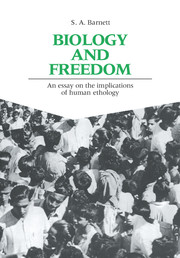Book contents
- Frontmatter
- Contents
- List of illustrations
- Preface
- Acknowledgements
- Part 1 An introduction
- Part 2 Homopugnax: the violent species
- 4 Communication and instinct
- 5 The aggression labyrinth
- Part 3 Homo egoisticus: the selfish species
- Part 4 Homo operans: the greedy species
- Part 5 Homo sapiens: the human species
- Glossary
- Notes
- References
- Name index
- Subject index
4 - Communication and instinct
Published online by Cambridge University Press: 04 August 2010
- Frontmatter
- Contents
- List of illustrations
- Preface
- Acknowledgements
- Part 1 An introduction
- Part 2 Homopugnax: the violent species
- 4 Communication and instinct
- 5 The aggression labyrinth
- Part 3 Homo egoisticus: the selfish species
- Part 4 Homo operans: the greedy species
- Part 5 Homo sapiens: the human species
- Glossary
- Notes
- References
- Name index
- Subject index
Summary
If a man elect to become a judge of these grave questions … he will commit a sin more grievous than most breaches of the Decalogue, unless he avoid a lazy reliance upon the information that is gathered by prejudice and filtered through passion, unless he go back to the prime sources of knowledge – the facts of Nature.
T.H. Huxley‘Behavioural science’, we are told, ‘really knows so much about the natural history of aggression that it does become possible to make statements about the causes of much of its malfunctioning in man’. Moreover, ‘aggression … is an instinct like any other’, and ‘in human social behaviour, innate species-specific … response norms play a far greater role than is generally assumed’. These are statements from an influential popular work by K.Z. Lorenz. Similarly, Nikolaas Tinbergen, the principal founder of the modern science of animal behavior (ethology), states: ‘In order to understand what makes us go to war, we have to recognize that man behaves very much like a group-territorial species.’ In saying this he equates his own species with, for example, baboons, of which some groups occupy regions of African plains to the exclusion of other groups. Although – Tinbergen tells us – ‘we are forced to speculate’, nonetheless ‘comparison of present-day species can give us a deep insight, with a probability closely approaching certainty, into the evolutionary history of animal species.’
- Type
- Chapter
- Information
- Biology and FreedomAn Essay on the Implications of Human Ethology, pp. 33 - 55Publisher: Cambridge University PressPrint publication year: 1989



